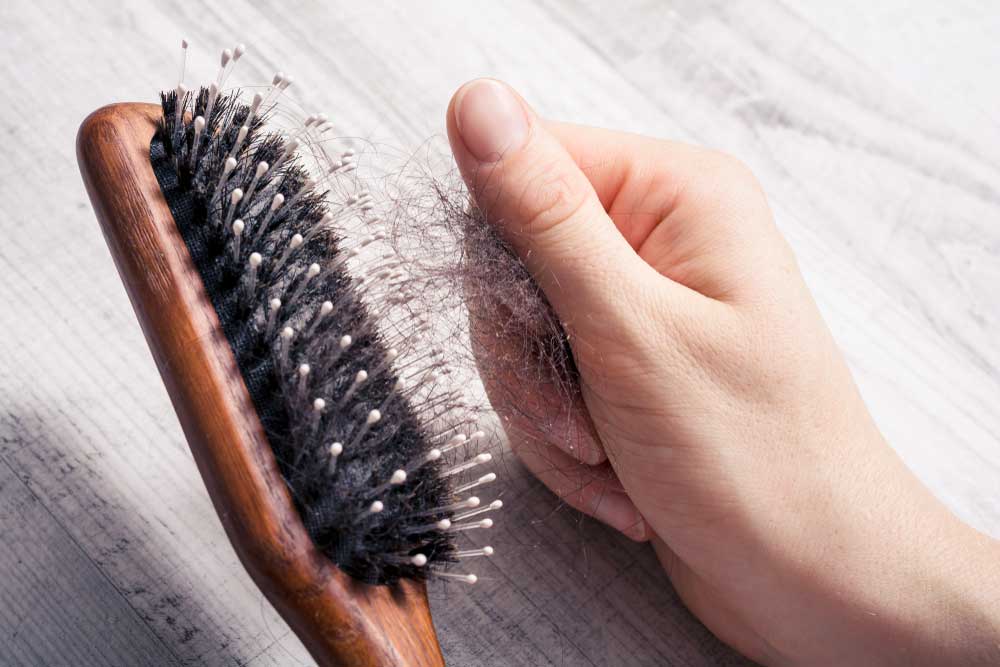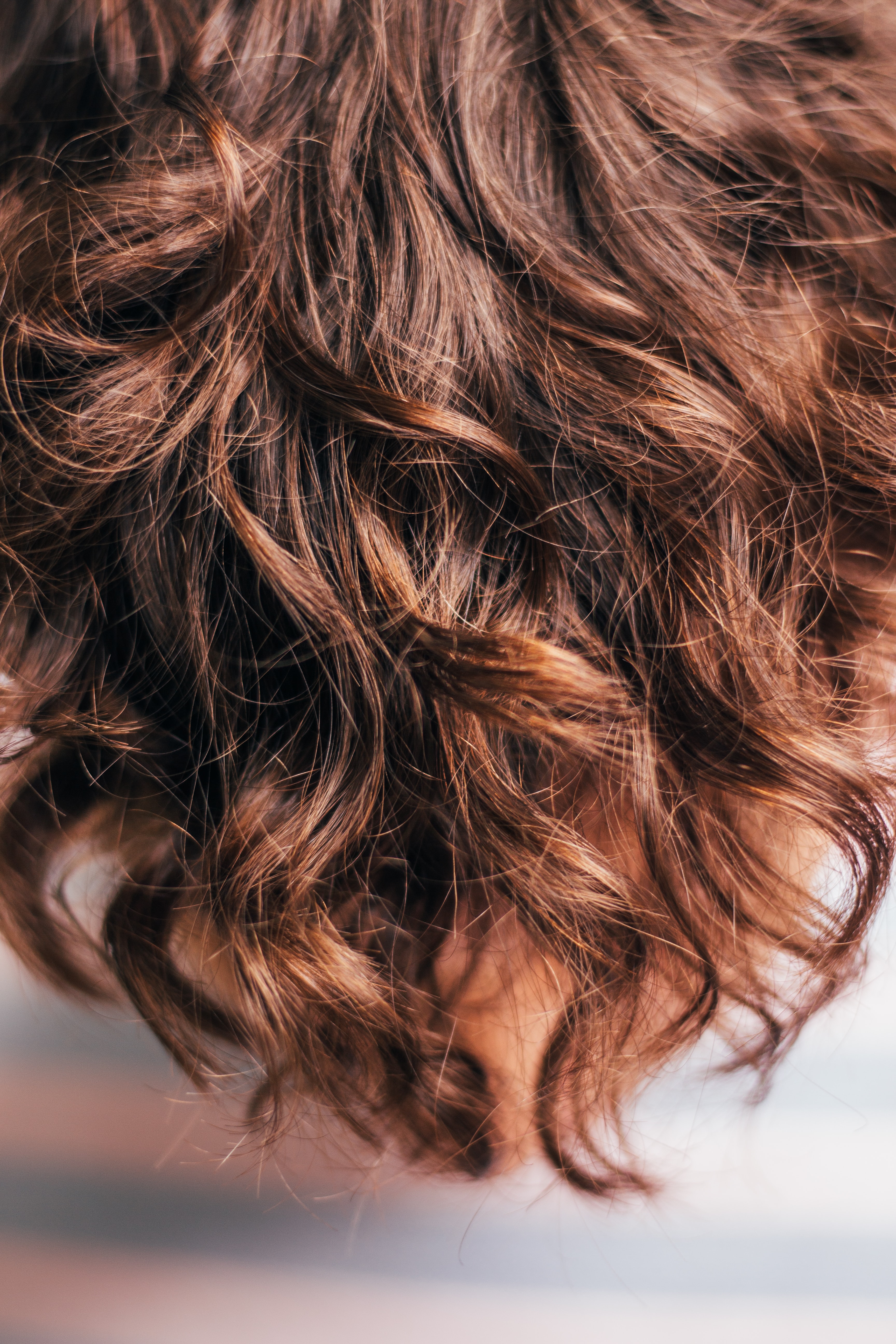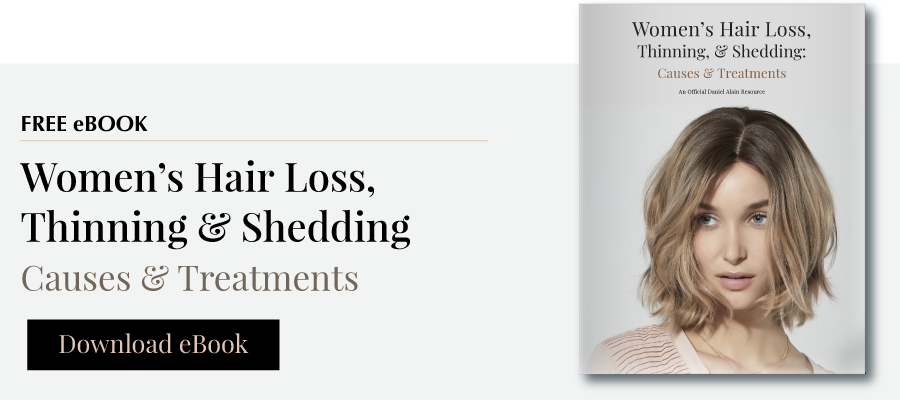What Causes Hair Loss? List of Top Reasons for Losing Your Hair | Daniel Alain

You’re brushing your hair, and your heart sinks when you look at the brush: thick clumps of hair have collected along the bristles. What causes hair loss to this degree?
Is your hair thinning normally, or shedding significantly? Should you pursue hair loss treatments like Minoxidil, or shake it off as seasonal shedding?
Hair loss treatments only work if you know precisely what causes hair loss. We know how devastating hair loss is. As women, our confidence and identity are deeply rooted in our hair. That’s why it’s critical to know the cause of your hair loss early.
In this guide, we’ll walk you through all the possible hair loss causes to give you a comprehensive overview of what may—or may not be—causing your hair to fall out.
We’ll also equip you with viable solutions to combat hair loss, retain strands, or conceal lost hair.
With this information, you’ll feel more confident in taking an important step on your hair loss journey. And we’ll be with you every step of the way.
What are the Causes of Hair Loss?
There are many different causes of hair loss, from genetic hair loss to life events like childbirth or menopause, which can trigger hair loss. And within those causes—sub-causes vary from person to person.
Reasons for Hair Loss
Genes
Let’s start with the biggest culprit behind hair loss: genes.
Did you know that female pattern hair loss is the top cause of hair loss? You might also know it by its medical name, androgenetic alopecia, or hereditary hair loss. If you’ve been diagnosed, we know how isolated you might feel. But you’re not alone — genetic hair loss affects almost 30 million women in the US.
While symptoms usually appear when you reach your 40s-50s, genetic hair loss can present itself in girls as young as 12 years old. With genetic hair loss, your hair growth cycle falls out of rhythm.
Instead of passing through each stage rhythmically, it pauses in the shedding stage. The male hormone DHT (Dihydrotestosterone) causes follicular miniaturization in people (including women) with genetic hair loss. Meaning? Your hair follicles shrink and become prone to breakage, thinning, and shedding over time.
One way to combat genetic hair loss is to find out for certain that you have it. Daniel Alain is soon launching the first-ever at-home genetic hair loss testing kit.
Hormonal Changes
Your endocrine glands secrete all kinds of hormones that act as chemical messengers throughout your body. Hormones are vital for your body to:
- Metabolize food
- Maintain cognitive, sexual, and reproductive function
- Regulate mood and body temperature
- Grow, develop, and mature
Now, we all know what happens when your hormones become unbalanced. Hello, weight gain, mood swings, and irritability.
Unfortunately, a hormonal imbalance doesn’t spare your hair, with hair loss being a top symptom. Here are some hormones that cause hair loss if you have them in excess:
- Cortisol (stress hormone)
- Testosterone (male sex hormone)
- Thyroid hormones (body’s metabolic hormone)
The worst of them all for your hair? Cortisol shoots through your body during periods of stress. Some hair loss causes are interconnected. A cortisol hormonal imbalance could lead to anxiety and stress — another common cause of hair loss.
Anxiety & Stress
Did your mom ever yell, “you’re making my hair fall out,” when you acted up? There’s truth to that statement. Anxiety and stress put us, and our hair follicles, on edge.
Stress is certainly a factor in hair loss and can cause conditions like telogen effluvium, also called stress hair loss.
Sometimes that stress compounds into anxiety, which makes you feel even more nervous about the hair loss. People with anxiety disorders might face the same hair loss symptoms as someone dealing with a stressful event. And for the conditions that aren’t on paper? Women often report hair loss as a symptom of stress in clinical settings.
In dire need of a relaxing spa day? Book it. Your body and psyche can’t function long-term under long periods of stress. And your hair can’t handle it either.
Let’s get back to telogen effluvium. Telogen is the hair growth cycle’s resting phase, followed by the anagen (growth phase). But what if your hair doesn’t make it to the next stage? Telogen effluvium occurs when stress and anxiety force your hair into the resting stage before it’s ready.
The result? Abrupt hair loss (often in handfuls) after a few months. But here’s the good news: it’s temporary. Just wait another few months and manage those stress triggers for it to subside.
Doctors can tell telogen effluvium-affected hair easily with a biopsy, checking whether the roots are club-shaped.
What can you do? Luxuriate at that spa. Take some time off work. Detox from tech. Your hair is begging you for some sweet relief.
But what if you do all that and the hair loss persists? You might be the most relaxed person in the world, but nature always runs its course.
Age
Naturally, your body changes when you age. Skin thins, muscles shrink, and bones weaken. And hair experiences just as many changes.
But what causes hair loss specifically when you age?
German dermatologists discuss a history of studies exploring how aging affects hair. Turns out that age affects the characteristics of each hair strand, including:
- Curvature
- Diameter

Curvature: Experts describe hair curvature as how each hair fiber bends: straight, bent/curly, or twisted. Your wavy hair depends on your follicles, with round follicles linking to straight hair, oval to wavy, and twisted.
The dermatologists exploring aging and hair loss cite a study on hair fiber curvature from Japan. Researchers examined hair curvature in Japanese women aged 10-70 and found that it increases and scatters with age. Hair fibers with different curvature patterns contribute to breakage.
Diameter: The diameter of each hair strand speaks to the fineness of your hair. Various studies show that hair strand diameter tends to shrink with age. Hair diameter tends to shrink in women experiencing menopause, which contributes to decreased growth and density.
Keep in mind that these are general findings, peppered with instances of women who went back and forth from coarse to fine hair even in their 40s. Point being? The texture and thickness of your hair endure many changes as you age, all of which can contribute to hair loss.
On top of that, hereditary hair loss presents during the 40s-60s.
Lifestyle habits and underlying health issues are as influential on women’s hair loss. Age is a factor, but poor lifestyle decisions accelerate loss. You can mitigate age-related hair loss with stress management, exercise, and of course, healthy eating.
Diet
Every part of your body is influenced by food. Inflammation, weight, and blood pressure increase if you eat too much sugar; oats and legumes give you energy; fatty fish give clear, glowy skin.
Your body craves essential nutrients to function, and so does your hair. Remember telogen effluvium, the stress-induced hair loss condition? Poor nutrition is a form of bodily stress that can trigger it as well. Only this time it can be chronic, ongoing for months.
What does poor nutrition look like?
- Eating disorders like anorexia nervosa
- Excessive calorie restrictions like the Master Cleanse diet
- Nutrition deficiencies such as B-12 or iron.
Your hair follicles need a ton of vital nutrients to give it the luscious shine and regular growth we women crave.
Excessive calorie restriction and crash diets block the follicles from absorbing vital nutrients critical to healthy growth. A nutritional deficiency in any of the following can contribute to hair loss:
- Protein: Keeps hair strong and prevents breakage
- Vitamin D: Promotes hair growth
- Biotin: Produces keratin, a protein that makes up your hair strands
- Iron: Boosts blood circulation and helps oxygen reach your hair follicles
- Calcium: Promotes androgen secretions that stimulate hair growth
Examine your diet and try to find any gaps in these important nutrients. If you’re uncertain, consult your doctor or a certified dietician to craft a nutritional plan your hair (and body) will love.
Medical Conditions
Hair loss is a symptom of many medical conditions, including:
- Thyroid disorders (hyperthyroidism and hypothyroidism): Prolonged thyroid disorders might cause hair loss across the entire scalp.
- Anemia: Iron deficiency that slows down blood circulation and prohibits your hair follicles from receiving oxygen and essential nutrients to grow
- Autoimmune diseases like Crohn’s, Hashimoto’s, and Graves disease cause your body to attack itself, as is common in people with alopecia areata.
- Psoriasis: Scalp psoriasis is so itchy, and ongoing scratching weakens hair strands, inflames your scalp, and can cause hair loss.
- Polycystic ovary syndrome (PCOS): Women with PCOS sometimes have high androgen levels, which cause hair loss around the temples and frontal scalp regions.
Hair loss from medical conditions isn’t always permanent. Some patients see regrowth once they manage symptoms or recover. However, the hair loss might not go away on its own.
This problem is exacerbated if you’re taking a medication that lists hair loss as a side effect.
Medications
When’s the last time you inspected the side effects on your prescription? Tons of commonly prescribed medications cause hair loss as a side effect, including:
- Mood stabilizers like lithium and carbamazepine
- Blood pressure meds like beta-blockers and chlorthalidone
- Antibiotics like penicillin and cephalexin
- Antidepressants such as Paxil
- Cholesterol-decreasing drugs like simvastatin and Lipitor
- Steroid Like Anadrol and Anavar
- Thyroid medications like carbimazole and propylthiouracil
- Weight loss medications like phentermine
Out of all these medications, what causes hair loss the most? Luckily, most of these drugs’ side effects only include hair loss for a small number of patients — between 1-10%.
But, unfortunately, radiation is a different story.
Radiation
Chemotherapy is the most common form of radiation that causes hair loss. Unfortunately, there’s little to combat radiation-induced hair loss. This is known as anagen effluvium, hair loss occurring after a sudden environmental shock. For many women, hair will regrow following the completion of chemo treatments. In the interim, you can maintain autonomy over your hair by wearing a beautiful human hair wig that embodies your natural hair.
But chemotherapy isn’t the only place you might encounter radiation. History has seen radiation exposure through nuclear accidents and wars in Eastern Europe and Japan.
Tight Hairstyles
Are you a sucker for tight ponytails, slick braids, and oh-so-sophisticated up-dos? We don’t blame you—it’s hard not to ogle at Ariana Grande and Kim Kardashian’s poised ponies or Zendaya’s gorgeous cornrows.
But tight hairstyles are the biggest cause of traction alopecia, a hair loss condition caused by consistent hair pulling. Trichotillomania is another condition in which people pull out their own hair.
We’re not saying to ditch the tight hairstyles completely–they might be vital to your style. But why not switch it up once in a while to give your hair follicles a break?
Instead of wearing tight braids every day, save them for the weekends.
Opt for looser ponytails once in a while to channel a relaxed, chic look like Mandy Moore and Danielle Bernstein in this collection of celeb ponytails.
Menopause
When you approach your 40s and 50s, menopause unfurls with hot flashes, mood swings, weight gain, and a host of other symptoms. Estrogen and progesterone hormone levels plummet. Could it get any worse for your hair follicles?
On top of reproductive hormone imbalances, cortisol and adrenaline wreak havoc on your hair growth cycle.
The result?
A surplus of androgens prompts follicular miniaturization, leading to hair thinning, shedding, and loss.
But menopausal hair loss isn’t permanent most of the time. You can mitigate it with:
- Healthy eating
- Exercise
- Medication like Minoxidil and Finasteride
- Stress management
Finally, hair loss pops up during another life stage for women:
Postpartum
Hormones are a major contributor to women’s hair loss. And there’s no shortage of hormonal imbalances in a woman’s life. One of the most prominent phases? Postpartum hair loss.
During pregnancy, your hair looks better than ever. Heightened estrogen, HCG, and progesterone give that extra oomph—gorgeous volume, thickness, and shine! But after you give birth? Hormones deplete, deflating your hair and causing newfound hair loss after 2-4 months.
The good news? Postpartum hair loss doesn’t last forever. It’s a temporary shift that regulates itself after 4-6 months.
What You Can Do For Hair Loss
If you’re going through hair loss, you’ll experience many hard days. There will be days you want to give up or can’t bring yourself to go outside. When we women lose our hair, it strips our femininity, robs our confidence, and leaves us feeling listless and forlorn.
But hair loss isn’t hopeless. You have many options that are worth exploring, which we’ll cover next.
See if Minoxidil Will Work to Regrow Your Hair
Minoxidil is a drug that comes in 2% and 5% concentrations and helps stimulate hair regrowth for some women. You might see it commonly referred to as Rogaine®, its most popular brand name.
The downside? It takes months (9-12) to see optimal results. For some, results never appear. That’s why Daniel Alain’s researchers spent years investigating the drug and how it stimulates hair growth. We discovered a breakthrough in our understanding of how Minoxidil works: it only activates in people with SULT1A1 enzyme activity.
Here’s the question: how do you figure out whether you have that enzyme activity? Two ways. You can wait months to see if Minoxidil will work. Or:
You can buy Daniel Alain’s revolutionary Minoxidil Response Test — the only way to know whether you’ll respond to Minoxidil within one week.
Try Out Finasteride to Combat Hair Loss
You might know Finasteride by its commercial brand Propecia — an oral medication for men but sometimes prescribed to women. One study found that Finasteride stopped hair loss in premenopausal women. The drug stops DHT production – the male hormone that causes hair loss.
But whenever taking a new drug, proceed with caution. Always consult your doctor to learn about all the risks.
Use an Anti-Hair Fall Treatment to Retain Your Hair
Hair loss happens in the follicles. This means that should be your first point of treatment. Daniel Alain’s innovative root securing complex, INTACT, locks hair strands in at the root during high-shed activities such as brushing, washing, and styling. The lab-formulated serum triggers the tiny follicular muscles to constrict around the strands, helping you retain more hair.
Of course, you can also make lifestyle changes and assess your nutrition to combat hair loss. But what if everything you’ve tried isn’t enough? Or you simply don’t want to try any other treatments?
Procedural Solutions
- Hair Transplant Surgery: This entails taking a small section of hair follicles from the back of your scalp and having the grafts placed on areas with hair loss. Learn more about your options for hair transplants here.
- Protein-Rich Plasma (PRP Injections): In this regenerative procedure, a medical professional takes your blood and separates blood platelets from the plasma. Then, they inject the platelets into patchy or balding scalp areas. Learn more about PRP here.
Explore Natural-Looking Human Hair Wigs
There’s no shortage of hair loss causes, making it tricky to pinpoint the right treatment plan for your hair loss. Now that you understand all the different causes of hair loss, you’re one step closer to finding a treatment plan that works. And maybe that treatment plan involves a brand new, undetectable, premium human hair wig that moves flawlessly, offers luxurious volume, and makes you feel fabulous.
Find a Solution for Hair Loss at Daniel Alain!
No matter what causes hair loss, you have options. As disheartening as the journey can feel, allies like Daniel Alain are here to offer you the latest breakthroughs in hair science, effective solutions, and a companion to empower you to fall in love with your hair again.
Ready to reclaim your confidence? Browse the Daniel Alain's premium wig collection today, or book a consultation with one of our stylists to discuss your treatment options.
Frequently Asked Questions
What Types of Hair Loss are There?
There are many different hair loss causes, including:
- Genetic hair loss (androgenetic alopecia)
- Traction alopecia (primarily caused by tight hairstyles)
- Stress-induced hair loss (telogen effluvium)
- Postpartum hair loss
- Menopausal hair loss
- Hair loss as a side effect of medication
- Hair loss as a symptom of health conditions
What are the Signs of Hair Loss?
If you suspect hair loss, look out for these signs:
- Widening hair part
- Thinning hair
- Hair clumps in hairbrush and shower
- Patchy hair loss across the scalp
- Receding hairline
Why Am I Suddenly Losing So Much Hair?
Hair loss causes vary greatly. You might be losing hair because of genetic hair loss, hormonal imbalances, medication side effects, and many other causes.
Which Lack of Vitamin Causes Hair Loss?
Your hair follicles crave nutrients to perform their best, just like your bones, skin, and muscles. You might experience hair loss if you have any deficiencies in the following nutrients:
- Vitamins D, K, and A
- Iron
- Zinc
- Calcium
- Protein
How Can I Stop Hair Loss?
Hair loss isn't forever, no matter what condition you struggle with. If you have stress-induced or diet-related hair loss, calming techniques, exercise, and enhanced nutrition can stop hair loss.
If you have genetic or hormonal hair loss, you might try hair loss medications like Minoxidil or Finasteride.
If medications and lifestyle changes don't work, you can always try cosmetic solutions like wigs and hair toppers. Daniel Alain offers 100% human hair wigs that provide ample bounce and shine.
Does Creatine Cause Hair Loss?
No. There isn't enough evidence to link creatine and hair loss.
Does COVID Cause Hair Loss?
There is definitely a link between COVID-19 and hair loss. COVID-19 is a stressful event for many. The influx of cortisol can also cause telogen effluvium.
Can the COVID Vaccine Cause Hair Loss?
Hair loss isn't a common side effect of the COVID-19 vaccine. But that doesn't mean it never happens. One study examined hair loss, specifically recurring alopecia areata, linked to the COVID-19 vaccine in three participants in Italy.
Do Hats Cause Hair Loss?
Usually, hats won’t cause hair loss. However, traction alopecia is a hair loss condition that results from constant pulling. So, if you wear tight hats often, it could lead to hair loss.
Does Dandruff Cause Hair Loss?
Dandruff doesn't directly cause hair loss; however, it might be a contributing factor. Itching often accompanies dandruff, and frequent scratching may damage your hair follicles and cause hair loss.
Can Stress Cause Hair Loss?
Yes. Stress results in the release of a hormone called cortisol, which is linked to telogen effluvium. Luckily, hair loss from stress often subsides once you address the cause of stress.
Can Anxiety Cause Hair Loss?
Yes. Anxiety is often accompanied by stress, a known culprit for telogen effluvium.
Does Diabetes Cause Hair Loss?
Diabetes doesn't directly cause hair loss. However, it links to other conditions and increases your chance of hair loss. For example, diabetes occurs in some women with hypothyroidism, a condition that sometimes causes hair loss.
Does Radiation Cause Hair Loss?
Yes, radiation is known to cause hair loss in men and women. It may stem from chemotherapy treatment or environmental stressors like historical nuclear accidents or wars.
What Medications Cause Hair Loss?
Many medications cause hair loss, but it's important to examine each medication individually. While one medication may list hair loss as a side effect, it may only occur in a small subset of people that take the medication. Examples of medications that cause hair loss include:
- Mood stabilizers
- Blood pressure meds
- Antibiotics
- Antidepressants
- Cholesterol-lowering drugs
- Steroids
- Thyroid medications
- Weight loss medications
Does Testosterone Cause Hair Loss?
Testosterone and hair loss aren’t explicitly linked. However, increased DHT levels (a male hormone and derivative of testosterone) is known to cause hair loss in women with androgenetic alopecia.
What Foods Cause Hair Loss?
A shortage of essential nutrients like vitamin D and protein can cause hair loss. Additionally, processed foods and refined sugar are known to cause hair loss.
Does Nicotine Cause Hair Loss?
A smoking and hair loss study found that smokers are more likely to experience hair loss than non-smokers.
Does Vaping Cause Hair Loss?
Vaping can be just as damaging to the hair follicles as nicotine from smoking cigarettes, this is because the smoke can damage the hair follicles irreversibly.
Does Chemo Cause Hair Loss?
Yes, chemotherapy and radiation therapy can cause hair loss in many patients, known as anagen effluvium.
Does Losing Weight Cause Hair Loss?
Yes. Excessive calorie restriction and crash diets can bar your body from essential nutrients that your hair follicles need to grow.
Can Lack of Sleep Cause Hair Loss?
Certainly. When we don’t get enough sleep, we feel irritable and stressed out. That stress releases cortisol, a hormone linked to telogen effluvium—stress-induced hair loss.



